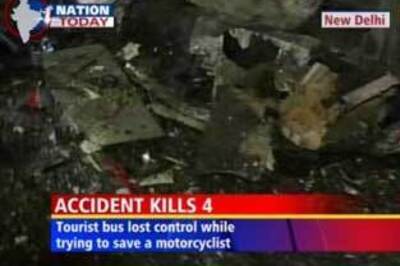
views
Bhubaneswar: RBI Governor D Subbarao has said that rising prosperity in rural India is leading to food scarcity, which is driving up food prices.
"Since rural incomes are going up, people are eating better by shifting from cereal to protein (rich diet) and it is leading to food scarcity," Subbarao told students of the Indian Institute of Technology (IIT), Bhubaneswar on Saturday.
Food inflation, which has been hovering in double digit levels for the last few months has been a cause of concern for the government. It rose to 11.49 per cent for the week ended February 12 from 11.05 per cent in the previous period, driven by rising prices of milk, egg, meat and vegetables.
"RBI is responsible for management of inflation. But responsibility for food inflation is slightly lower because food inflation arises due to supply side constraints," Subbarao said.
To combat food scarcity and consequent soaring prices, immediate steps should be taken to raise agriculture output substantially in the country, he said.
While advocating for another green revolution in the country, the RBI Governor said food scarcity could be tackled effectively if half of the states in the country would touch the productivity level achieved by Punjab, the country's food bowl.
Punjab's food grain yield is pegged at 4,231 kg per hectare against the national average of 1,909 kg per hectare. During 2008-09, which was a record year for foodgrain production in the country, the state's contribution was 11.66 per cent.
For stepping up farm productivity and production, it is necessary to increase investment in water management and rural infrastructure, Subbarao said.
About 60 per cent of the country's farm land relies on rain water for irrigation.
On the need to strengthen the supply chain, Subbarao said foreign direct investment in retail sector would go a long way in improving farm to market supply chain.
"India cannot import food as it has to feed around 1.2 billion people. Our food prices are lower than that of world prices. You cannot import food and sell them here unless you subsidise. You cannot expect to subsidise food on a large scale," he said.
"There exists a paradoxical situation of subsidizing farmers for producing food and subsidising consumers so that that they get food at lower price. It is simply unsustainable," he said.
Referring to world-wide food shortage, Subbarao said that between December 2009 and December 2010, food prices in the world market had gone up by 25 per cent.
Speaking on RBI's role in reining in inflation, he said, "Monetary policy becomes the first line of defence, so if inflation persists for a long time people think inflation is going to be high, and that becomes a self-fulfilling prophecy.
To break that inflationary-expectations psyche, RBI has to act, which is why we have been acting over the last year."
Subbarao also suggested that the government should spend more on education, public health and child welfare programmes. Expenditure on education should be raised to six per cent of the GDP from the present level of four per cent, he said.
Describing infrastructure a crucial input for development, he said since government lacked adequate funds public-private partnership was being adopted.




















Comments
0 comment